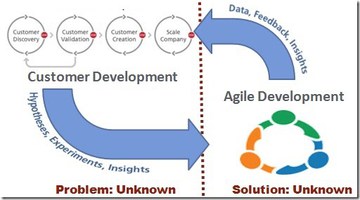Customer Development is a clear and well-defined approach to the commercialisation of disruptive innovation. Steve Blank introduced the Customer Development approach (in full but primarily for enterprise software startups using B2B) in his book “Four Steps to the Epiphany”.
Customer Development involves four stages:
- Customer Discovery – validation of the problem, solution, product and market (and other aspects of the business model),
- Customer Validation – further validation of the business model and proving the sales process is repeatable and scales,
- Customer Creation – scaling the business by pumping customers into the proven sales funnel, and
- Company Creation – transitioning from a startup to an executing business.
The Lean Startup approach when carried out in full involves Customer Development with Agile Product/Service Development implemented in the Build-Measure-Learn loop discussed previously. This is represented in the diagram below:
Central to Customer Development is “getting out of the office” and talking to customers (and others involved in the business model, e.g. partners, channel providers). Steve Blank calls these “customer interviews” and they are semi-structured interviews where the initial focus is on gaining insights about the customers (and others involved in the business model) rather than just statistics. These are not just surveys.
Customer Development uses the “Business Model Canvas” developed by Alexander Osterwalder to document the hypotheses about all aspects of the business model (e.g. the market segments, value propositions, partners, cost structure, revenue structure). The founders job is then to validate these assumptions via customer interviews or change them (pivot). Web/mobile startups may also use Web analytics (i.e. data about a customer’s interaction with the Web/mobile site) to supplement these interviews.
Customer Development is itself a highly iterative and incremental process that includes a number of pivot points. Pivots represent a change in strategy (business model) without generally a change in the vision for the startup. Lean startups are encouraged to pivot if they cannot achieve problem-solution fit or product-market fit or a repeatable and scalable sales process, rather than to continue on with likely failure.
The term Customer Development was coined by Steve Blank.
